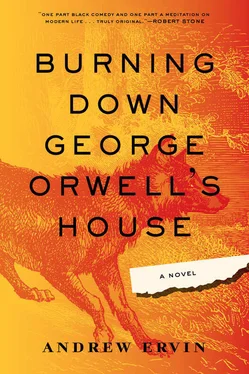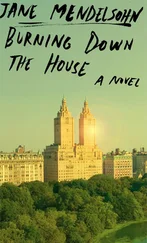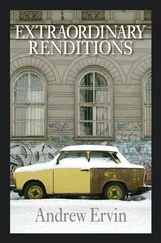“Don’t you think that it’s up to her? I understand that—”
“Here’s what it feels like,” Pitcairn said.
The loud crack hit Ray’s ears first, echoed four or five times off the Paps, and then came back to rest in his stomach. He had been shot.
The pain arrived as a new sensation. It wasn’t like anything. Not the sharp sting of an insect or like being hit with a hammer. It didn’t feel like anything except what it felt like to get shot. He knew now. It fucking hurt. His own fluids glued his clothing to his body. The wound wasn’t a small toothless mouth or a reproduction of A Sunday on La Grande Jatte done the size of an Indian Head nickel: it was a bullet hole in his stomach. The metaphors arrived slowly. His belly now contained a tiny baby of lead who sucked the nutrients from his body. Then it was a fisherman’s sinker plugging a hole in the ocean. A.44-inch paperclip fastening his mortality to his immortality.
He had been shot. Pitcairn had shot him. The smoke danced from the barrel of the pistol and was lost amid the fog. The pain was mesmerizing. Ray fell to the ground and remained there. Pitcairn looked down at him and spat into the cold heather in which Ray now wanted to sleep. Just a short nap. The ground was comfy. The fog blanketed him.
Pitcairn’s boots grew smaller, quieter. Ray closed his eyes. The earth itself grabbed wetly at his clothes; it found his skin, pulled him closer, held him tight. Shhhhhh , the wind said. Every so often a gust blew away some of the fog and the stars would poke through the shifting windows of starry sky. All the tensions and tightnesses inside him gave way and his body deflated even further to the ground.
Another breeze brought with it a sharp odor of putrefaction, something animalic and rotten.
A live wolf stood not three feet away. It smelled of iron, of decaying earth. Its luxurious coat glimmered like polished silver even in the little light afforded by the stars. The creature looked him in the eye and growled ever so quietly, a low sonic rumble Ray felt in his chest. His body purred along involuntarily with the wolf’s breath. He felt the weight of the creature’s heartbeat, heard the blood sluicing through its taut musculature. He became aware of his own pulse beating at the base of his neck, and the enormous wolf sensed his quickened pulse too; it wanted to find the source of Ray’s remaining warmth with its teeth, to drill its hungry muzzle into the too-small bullet hole.
“It hurts,” he told the wolf. He showed it the blood on his sweater. “Do you see what happened to me?”
The wolf moved a step closer. Ray read its yellow eyes. The growl grew louder, more specific to him and his last moments on earth. Louder than the agony in his belly. The wolf understood him; it was here to lift him from his pain.
With this creature breathing its moist breath onto his face, the only choice now was between acceptance and resistance. That had been his only choice all along. All of his previous ideals about freedom and independent thought, all the marketing strategies in the world, every advertising campaign, those were meaningless in the face of a lunatic with a gun or a carnivorous monster. His life all along had followed a circumambulating path between free will and fate, but had always returned to the fate side.
Ray chose acceptance: there would be no more fighting it. No more challenging the collective wisdom of his grand and enlightened civilization. He would neither fight any longer nor flee. Not to the most distant corner of the most remote island on the planet or into the darkest recesses of his own miserable and troubled mind. He would accept with all his heart what the wolf had come to tell him; he would take responsibility only for those things within his power to control. The plundering of the rain forests was not his sole doing. Neither was the destruction of the last orangutan’s native habitat or the mercurial toxicity of seafood or the fact that Moby-Dick could no longer communicate with other whales over long distances because of the human race’s vehicular noise. Even the immense pollution caused by fossil fuels — that wasn’t entirely his fault. “Do you know what I saw today?” Ray asked the wolf.
A flicker passed through the creature’s eyes, and it flinched an instant before the beam of a flashlight captured it.
“Everything I looked at,” he said.
The blast from a shotgun kicked up the dirt next to him and lodged a few hot pellets in his skin. The wolf, unharmed, was gone as if it had never been there.
The rest of the night was a blur. He remembered lying next to the bonfire in the clearing between the Paps. He watched Fuller tap a barrel of whisky and rub some of it on the wound in his side. That pain was even worse than the initial gunshot. He seemed to remember Sponge and Pete carrying him from under his shoulders across the lobby of the hotel, his feet dragging across the floor, where thanks to Mrs. Campbell’s bitterness he went the entire night without food or water or even clean bandages.
A DOCTOR CAME OVER on the first ferry of the morning and tended to Ray’s wounds, which were neither superficial nor life threatening. The prognosis was better than the pain led him to believe. The doctor, out in the hallway, gave Mrs. Campbell the tongue-lashing of her long and nosy life. “Is this how you treat your guests on Jura?” she asked. “You should be ashamed of yourself!”
Ray restrained his laughter, but only because it hurt so goddamn much. The bickering was interrupted by the sound of someone coming up the stairs whistling. His next visitor was Mrs. Bennett, who had very thoughtfully brought him some expensive supplies from The Stores. “How are you feeling, Mr. Welter?”
“Like hell.”
“Well that’th to be expected — you have been thot. I’ve brought you thome thingth.” The box she carried contained bandages, ointment, cotton balls, medical tape. Everything he would require to keep the gunshot clean. “When you’re feeling up to it, I’d like to talk to you about your planth for Barnhill.”
“My plans for Barnhill?”
“Yeth. Our letting agenthy hath a young couple in London who ith quite eager to athume the leathe on the houthe.”
“You’re kicking me out?”
“Oh heaventh no, Mr. Welter. We had jutht thought that you would be leaving, given your condition. They are offering to pay conthiderably more each month than yourself, tho I’m confident we could work out a mutually beneficial arrangement. There are many other beautiful and more convenient hometh available should you with to thtay on Jura.”
“I’ll give it some thought, Mrs. Bennett. Thank you for the bandageth … I mean, bandages.”
He got out of bed. Every step hurt. The envelopes and pewter flask weighted down his pants. He had forgotten about that. In the movies, a man’s flask was supposed to deflect the bullet and save him from this kind of agony. Reality was infinitely more subtle, and more painful.
Still in his bloody clothes, he made it downstairs with Mrs. Bennett’s help and without running into Mrs. Campbell.
“Pleathe think about what I’ve thaid, Mr. Welter.”
“I will, thank you. I’ll drop by for some boots as soon as I’m feeling better.”
Ray sat on the porch of the hotel, unsure of his next move, until Farkas pulled up. He looked like he hadn’t slept. There were sticks and twigs in his hair and beard, mud on his nose. “As I understand it,” he said, “you’re lucky to be alive.”
“What’s so lucky about attempted homicide?”
“There is the attempted part.”
“Pitcairn tried to kill me,” Ray said. He had to bend over to climb into the car and pain filled his lungs. “He should be in jail.”
Читать дальше












